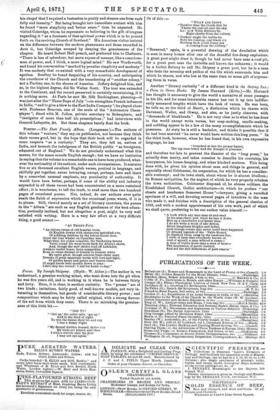Another "literary curiosity" of a different kind is the Setting
Sun : a Poem in Seven Books. By James Hurnard (Kitto.)—Mr. Hurnard has thought it necessary to give the world a narrative of some passages in his life, and for some inscrutable reason has cut it up into indiffer- ently measured lengths which have the look of verses. He was born, he tells us, on the third of March, a distinction which he shares with Davenant, Waller, and Otway, and also, as he justly observes, with "thousands of blockheads." He is not very clear as to what he has done in the world except write verses, but soap-making, candle-making, and cobbling appear to be a few of the many accomplishments which he possesses. At sixty he is still a bachelor, and thinks it possible that if he had been married "he never would have written this long poem." In the third book, however, when ho has found that, in his own expressive language, he has
"broached at last the proper barrel, The tap runs freely and the draught is pleasant,"
and therefore too late to prevent the disaster of the "long poem," he actually does marry, and takes occasion to describe his courtship, his honeymoon, his house-keeping, and other kindred matters. This being done with, he gives his opinion about men and things in general, and especially about Colchester, its corporation, for which he has a consider- able contempt; and its town clerk, about whom he is almost libellous ; its Roman antiquities, for the neglect of which he very properly rebukes the town authorities. Colchester disposed of, he abuses soldiers, the Established Church, Gothic architecture—to which he prefers " our chaste and handsome Somerset House "—lawyers, giving a versified specimen of a will, and devoting several pages of invective to the man who made it, and finishes with a description of the general election of 1868, and with a modest appraisement of his own work, part of which we shall quote, preferring to let our author value himself :—
" A book which any man may sit and read In his arm-chair, and, when he lays it down, Rise up a cheerfuller and better man. I do not write a work of idle fiction, About imaginary knights and ladies, And strange events that never could have happened, Or dreamy legends of the Table Round,'
In slipshod verse, sung by the Laureate fiat;
I write of facts that everybody knows of,
And of myself, a man without a name— A man of truths more than a man of facts—
The inspiration of poetic instinct, And not the dull deductions of pure reason."


































 Previous page
Previous page